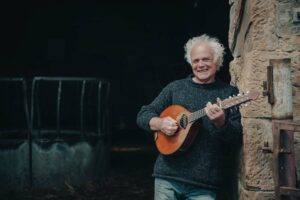 Dagger got his first guitar on his 13th birthday. Throughout his teens he mainly played rock and blues, but there was always an awareness of acoustic folk music – both well-known Scottish songs and the contemporary folk music of the time. He particularly remembers his mum taking him to see the Corries in Dornoch and also to the second Inverness Folk Festival to a gig with legendary guitar players Davey Graham and Martin Carthy.
Dagger got his first guitar on his 13th birthday. Throughout his teens he mainly played rock and blues, but there was always an awareness of acoustic folk music – both well-known Scottish songs and the contemporary folk music of the time. He particularly remembers his mum taking him to see the Corries in Dornoch and also to the second Inverness Folk Festival to a gig with legendary guitar players Davey Graham and Martin Carthy.
He started playing mandolin at about age 19 – a university friend called Nick Keir (who later became a member of the MacCalmans) had a mandolin which he used to play. On returning home to Easter Ross, Dagger started playing with Duncan MacGillivray, who had a very similar farming background to himself. He soon met Christine Martin, who was was a strings instructor living in Tain at the time, and together they formed a group called the Gizzen Briggs (the name ‘Gizzen Briggs’ is still used today by the very successful 50-strong school traditional music group based at Tain Royal Academy). Christine now lives in Skye, where she and her husband run the Scottish music publishing company Taigh Na Teud.
“At that time there was a lot of Irish music played in the Scottish folk scene, so we decided to concentrate on old Scottish material” he remembers. “I believe we were the first folk band to use the full Highland bagpipes along with acoustic instruments, with Christine playing fiddle and me playing guitar.” When Duncan left to join The Battlefield Band, Dagger formed the band Black Donald with Iain MacBeath on fiddle and Ian MacDonald on guitar and vocals. They played many gigs and made an album on the Lismor label called ‘Dancing Hazards.’
By this time, Dagger was playing mandolin, octave mandolin and tenor banjo, and not really playing much guitar any more. In 1988 he released his first solo album ‘Highland Mandolin’ – which was the first album of Scottish music to feature the instrument. In the 1990’s, Dagger was in a trio called Highland Connection with the late Ian Hardie on fiddle and Janice Clark on vocals and guitar, releasing a CD on Greentrax called ‘Gaining Ground.’
For the last 30 years or so, Dagger has played a lot of ceilidh dances with a range of Highland musicians. He still plays a lot in a trio with his old mates Duncan and Iain, and more recently with Amy Henderson, a young accordionist and singer from Kiltarlity.
Dagger started teaching guitar for Fèis Rois over 20 years ago. “I used to take our oldest son Colin to fiddle lessons there and they needed a guitar teacher at the time. I have continued doing it ever since, also doing mandolin and groupwork classes.” For many years, Dagger took music-making into primary schools as part of a program called the Youth Music Initiative. He has also tutored adults, mainly through the feis movement, and put a book called ‘The Scottish Mandolin Tutor’ with Taigh Na Teud about ten years ago.
Fiona Dalgetty, from Feis Rois, writes, “Dagger has inspired hundreds of young people in Ross-Shire through his community teaching with both Fèis Rois and the work he does with Gizzenbriggs in Tain. He is a regular face at Fèis Rois nan Inbheach in addition to teaching the weekly classes for children. His humour, patience and generosity in sharing his repertoire have benefitted many people of all ages in our community.”
Dagger reflects, “my music and my farming are a way of life for me, and I have found that music has been a huge benefit throughout my life. I always travel with my mandolin, and it has opened doors for me wherever I go. I find that I get a lot out of teaching young people and seeing them get better and developing a love for it, which I hope will always stay with them.” Dagger’s three sons all play music – indeed, he made a CD ‘Like Father Like Son’ with his eldest, Colin.
Post-covid, he says, “I think it will be some time until ceilidh dancing is fully operational again, but I continue to teach and get a tune wherever I can. Scottish music is a wonderful thing. It makes people happy and generates a great sense of community, but can also move people quite deeply. I have often seen this in visitors from other countries coming to gigs, and I always get the sense that they feel this is something that is somehow missing from their own lives – particularly if they are lucky enough to catch a good-going session somewhere, or go to a Feis Rois ceilidh trail event or something like that, and I would like to feel that I have contributed to this.”